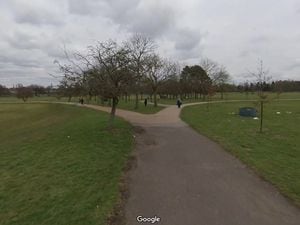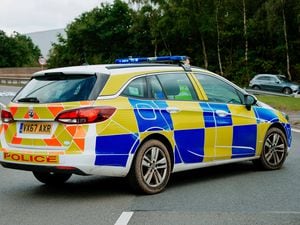West Midlands Police chief: Government must back us in fight against violent crime
Give me the resources I need to fight violence, head of West Midlands Police, Dave Thompson, tells ministers.
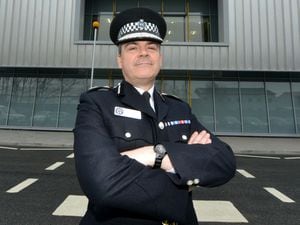
The West Midlands Police Chief Constable today appealed to the Government to give him the resources he needs to tackle knife crime.
Dave Thompson said forces in the most populated areas, such as his, were most in need of funding increases amid soaring violent crime.
He also suggested cuts to youth services have contributed to rising violent crime levels in the West Midlands and piled pressure onto the police in their efforts to try and tackle it.
The head of West Midlands Police said there needed to be a proper strategy around troubled young people at risk of falling into crime and gangs as it is often too late to help them by the time the police become involved.
Millions of pounds have been cut from council youth budgets in the region over recent years and youth centres have closed, which critics say has helped fuel violent crime.
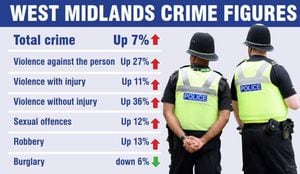
Latest crime figures show knife crime has risen by 17 per cent in the West Midlands and at a faster rate than anywhere else in the country.
Violence against the person is up by 27 per cent, violence without injury by 36 per cent and robbery by 13 per cent.
Mr Thompson said extra police officers was a start but that serious investment needed to follow.
He said: “My sense is if we’re serious about the outcomes the Government wants to achieve then investing in forces like West Midlands is important.
“From my perspective I will do more with what we get but I think there’s a broader debate to make sure West Midlands doesn’t lose through austerity and then not do as well as other people in terms of growth going back in.”
Mr Thompson said he was concerned about what was happening to children who have been excluded from schools or come from troubled backgrounds as there was now a lack of youth workers to spot the dangers.
He said: “There are less people out in the community as youth workers now, keeping an eyes and ears out on young people so we’re sometimes finding young people come to our attention that in the past perhaps a youth worker might have spotted them coming off the rails and then they’re with us.
“Those preventative, protective services have borne a heavy cuts burden, more than policing has and I think that has to be looked at as part as the strategy for prevention. The police will not solve why young people behave violently –they behave violently before they come into contact with us.”
Serious investment
Mr Thompson said he welcomed the commitment from Boris Johnson, which will see the force bolstered by an extra 1,200 officers over the next three years but said funding needed to reflect the size of the region it covers and the huge challenges that brings.
He said the extra officers would not restore levels to those in 2010 before austerity kicked in and that there was a disparity between UK police forces which could see others get larger while West Midlands Police remained smaller overall.
Some 2,000 officers were axed from the force over the previous decade while £175 million was cut from its budget.
The top-ranking officer also pre-empted and sought to fend off any accusations that the force was not making the most of its resources, insisting bosses had “done a hell of a lot of work to make sure we’re a really efficient police force”.
Latest crime figures showed knife crime had risen by 17 per cent in the West Midlands and at a faster rate than anywhere else in the country. Violence against the person was up by 27 per cent, violence without injury by 36 per cent and robbery by 13 per cent.
Mr Thompson also said county lines drugs gangs are one of the biggest issues facing the force.
Boris Johnson has indicated he is ready to take a tough approach on crime and the Chief Constable said funding for police forces where crime rates are highest will be key to that.
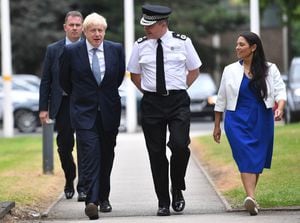
Mr Thompson told the Express & Star: “Crimes like robbery, between London and the West Midlands, that’s more than half the robberies in the country. If we want to cut these violent crimes, even things like county lines, we know the urban areas are the areas where a lot of crime projects go out into the rest of the country.
“At times I’ve been very surprised with previous governments why they’ve imposed cuts on urban areas heavier on policing because things like county lines are only going to be stopped by forces in urban areas being able to tackle those problems.
“So my sense is if we’re serious about the outcomes the Government wants to achieve then investing in forces like West Midlands is important. We come to the table having done a hell of a lot of work to make sure we’re a really efficient police force so none of this extra money is going into back office services, it’s not going into administration. We are putting this money into extra police officers to deliver results for the public.
“From my perspective I will do more with what we get but I think there’s a broader debate to make sure West Midlands doesn’t lose through austerity and then not do as well as other people in terms of growth going back in.”
However, he said early signs from Mr Johnson’s Government were positive and that he hoped the Prime Minister would deliver on his pledge to boost forces.
The Chief Constable said: “The increase in office numbers is a good start, good news. What I’m encouraged by from the Government is they are interested in reducing violence, reducing county lines, tackling robbery, all the things that affect urban areas.
“We just need to make sure the money follows the outcome the Government wants to achieve.”
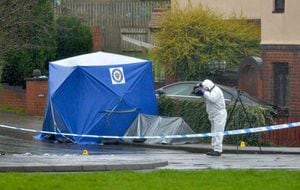
The recent crime figures made for grim reading with knife crime once again brought back into focus.
Offences involving a blade have tripled over the last five years and the challenge for police chiefs and politicians is how to tackle the rising tide of violence.
It came following a fatal double stabbing last week in Brierley Hill.
Mr Thompson called for a “strategy” for young people and raised concerns about those excluded from schools or from troubled backgrounds falling in with the wrong crowd.
He said a lack of youth workers to spot the dangers was compounding matters and that far more emphasis was needed on working with young people to ensure they do not slip into criminality or violence through gangs.
“Some of that is there is more attentiveness around the recording and classification around knife crime,” he said.
“Why has it risen? I think it’s across those three areas. We are definitely seeing more issues around people not dealing with conflict well and bringing knives to fights. I don’t think you can put one thing on it. We are always going to be at the higher end because we’ve got more young people than anywhere else in the country, we’ve got the highest proportion of under 25s in Birmingham than any European city.
“We’re doing a lot of work, we’re do a programme in our violence unit where we’re doing peer counselling about how we deal with conflict.
“The second area is around robbery, it’s half knife crime, and we’ve seen robbery go up quite considerably over the years.”
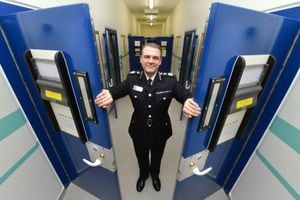
He added: “I think exclusions are a real issue. Schools clearly want to educate young people but if they’re not in school, either off-rolled or excluded, we don’t know what they’re up to and that whole issue about who else is out there making young people safe because by the time we’re in contact with them we’ve really already lost it a little bit.”
County lines gangs exploiting children and flooding smaller towns with drugs is a major problem, the Chief Constable said.
“The big area that concerns me most where I think the most extreme violence is is county lines and grooming young people and I think it’s a really tricky issue.
“There’s less youth services to help young people and spot who might be drifting off track.
“I have raised the issue about young people staying on for 16-18 education – that they’re not going into the market, they’re not mixing with older people, they’re staying in younger age groups. Criminals are much more sophisticated at grooming young people so we’ve got to keep diverting young people away from these areas but the criminals behind it we’ve got to relentlessly target and disrupt and take the profit out of crime as well as sending them to prison.”
The Chief Constable recently criticised what he called a “pretty senseless crime recording approach” and suggested having to record crimes that the police were unlikely to be able to solve would only hurt them in terms of their reputation with the public.
He says there has been a drop in relatively minor offences such as burglary and car crime, while the increase in reporting of domestic abuse, while welcome, was proving challenging for the force to keep on top of.

Mr Thompson said: “Things like residential crime are down are down about 14 per cent this financial year, which is really good news. We see the same with vehicle crime, similar reduction, 14 per cent. Crimes like robbery are going down which is really good. Discharges of guns have gone down considerably this year.
“The challenge, I think, is around the violence issue. First of all a huge proportion of violence now is domestic abuse. It’s great it’s being reported but it’s creating a challenge for us. We deal with more domestic abuse crimes now than we deal with burglaries, so it is actually a huge part of what the force does and we’ll see that recording go up I think.
“The big challenge that people are concerned about is the violence involving young people. We’re seeing some areas of that stabilise more but we’re seeing some tragic cases still and I think that remains the most complex and challenging issue and at the forefront of what the force has to do.
“I’ve always said it’s in three parts: managing this phenomenon of young men not dealing with conflict well and bringing a knife to a fist fight and we’ve done a lot of education prevention on that.
“Robbery is half the knife crime we see, that’s starting to reduce, down nearly three per cent this year and we’ve got to keep pushing that down but then this whole issue of drugs and county lines and we need to accelerate our effort on the involvement of gangs and it will certainly be an area where we will be putting extra officers.”
He added: “We need as as a country to have a strategy around young people. Young people are far more online. When I was younger we might have an argument with friends and that would be over until we went back to school the next day. People are wired 24 hours a day, that conflict is videoed, it’s circulated. Young people have more complicated lives.”




